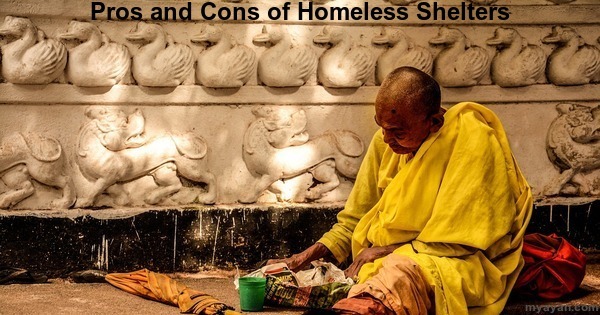Homelessness is an issue that affects millions of people around the world. In the US alone, there were over half a million such people, according to the HUD department recorded in 2022. The lack of housing, money, and resources leaves many struggling with the necessities of life. Homeless shelters are one of the solutions that cities and organizations offer to provide temporary relief to those without a home. These shelters aim to provide a roof over the head and the essential needs to sustain life. Compared to earlier years, the number of homeless has plummeted in recent years, all thanks to shelters. But are the shelters enough to curb the rising issue of overpopulation? These pros and cons of Homeless shelters give you a detailed overview of the situation.
Let’s look at the reasons and positive side first, which also count among the prominent pros of homeless shelters.
Homeless shelters provide temporary relief to those without homes. Instead of being outdoors and exposed to the elements, individuals can find refuge in a safe environment. Shelters offer a temporary bed, hot meals, and hygiene facilities.
Shelters provide basic needs, such as food, clothing, and hygiene facilities. These are necessary for people who may not have these resources available alone. Furthermore, most shelters also offer healthcare services, counseling, and education on job placement and other support services.
Homeless shelters offer a safe environment and access to resources to those who need them. This environment holds individuals accountable for their actions and dealings, improving their chances of finding stable employment and housing.
Shelters are designed to provide more than just temporary beds and meals. They promote a sense of community among its residents. Individuals have the opportunity to connect and support each other throughout their journey towards rebuilding their lives.
According to a report by myneighbor.org , 18% of homeless people are kids below 18. In addition to providing basic needs, some shelters offer educational programs for such kids for a better future. These are important resources for individuals who want to improve their lives and gain the skills necessary to find stable employment.
Despite the immense benefits that homeless shelters provide, there are still issues that cannot be deferred when looking at this form of assistance. Some of the cons of homeless shelters include:
As the demand for shelter increases, so does the overcrowding in shelters. This often leads to an unsafe environment and a lack of resources available to each individual. Additionally, overcrowding makes it difficult to maintain social distance in order to protect against the spread of viruses like COVID-19.
The safety of those in shelters is another concern to consider. Due to the lack of resources and overcrowding, homeless shelters can sometimes be unsafe environments for vulnerable individuals. This puts them at risk of physical or mental harm from fellow residents or perpetrators who may enter the premises.
Homeless shelters can often carry a negative stigma, further perpetuating the discrimination of those living there. Individuals are often judged for their current situation and looked down upon by society, making it difficult for them to find employment or housing in the future.
The lack of privacy due to overcrowding is another issue that homeless shelters face. Individuals cannot have a private space of their own, making it difficult to decompress and relax after a long day. In the long run, this can take a toll on one's mental health.
While homeless shelters provide essential relief for people without homes, they often lack the necessary resources to help individuals find long-term solutions to their homelessness. These shelters are only meant to provide temporary help and do not always offer permanent solutions such as job placement or housing assistance.
It's evident that homeless shelters can be a great starting point for people needing quick and safe housing, but there are still many drawbacks to consider. Whether the positives outweigh the negatives largely depends on an individual's experience in these habitats. Everyone has different needs and wants, so before deciding to reside in any homeless shelter, it's best to understand the nuances associated with it.
While it may offer temporary relief from homelessness, individuals should also weigh their prospects outside the shelter.
It’s important to research what options exist beyond a homeless shelter, whether having family or friends take you in or gaining assistance from local government funding programs as these can often benefit individuals against staying in a homeless shelter long-term. In conclusion, it’s essential to understand the pros and cons of homeless shelters before deciding to use them as a viable option for housing.

Children residing in impoverished or congested environments are more susceptible to respiratory ailments, heightened infection risks, and greater vulnerability to mental health challenges. Moreover, substandard or overcrowded housing jeopardizes the safety of these young individuals.
Proper housing offers security, personal safety, and protection from the elements while preventing health issues and diseases. Whether a temporary arrangement or a permanent home, adequate housing preserves people's dignity and allows them to live a normal life.
In these cities, Hyderabad and Delhi, several challenges related to shelter exist. One major problem is the need for more affordable housing units. The rapid urbanization and population growth have significantly reduced the construction of new homes, leading to a limited supply.
Poorly informed, designed, or implemented shelter and settlement programming can result in various negative impacts, including but not limited to unsustainable deforestation rates, degradation of land and soil, loss of biodiversity, and mismanagement of waste streams.